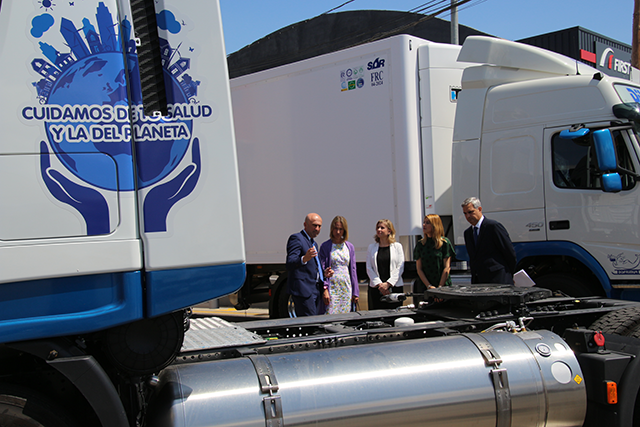The Energy Solutions Marketing Director at Gas Natural Fenosa, Alberto Fariza, and the General Manager of Grupo Disfrimur, Juan Jesús Sánchez, have today signed an agreement for the installation of two new natural gas refuelling stations in Molida de Segura (Murcia) and Antequera (Malaga) in an event at the Grupo Disfrimur headquarters attended by the group’s Financial Director, Isabel Sánchez; the General Director of Energy and Industrial and Mining Activity of the Region of Murcia, Esther Marín; and the mayor of Molina de Segura, Esther Clavero.
The location of the gas refuelling stations is of great strategic value due to its extensive freight traffic, as the first will be located in an industrial municipality with a high concentration of transport companies, and the second will be located in the industrial estate of Antequera, in what is known as the “kilometre zero” in Andalusia.
These two gas refuelling stations will be added to the three already existing liquid natural gas (LNG) and compressed natural gas (CNG) stations currently operated by both companies in Murcia, Alicante and Valencia. In this way, the location of these natural gas refuelling stations will allow for a radial supply to the hauliers who travel along the Mediterranean Corridor.
Additionally, these two new refuelling stations will also provide public service fleet such as urban solid waste collection and urban and inter-urban passenger transport vehicles. Private bi-fuel cars, taxis and rental car companies will also de included.
After signing the agreement, Alberto Fariza said that “this partnership demonstrates the commitment to sustainable mobility of both companies, a challenge in which Gas Natural Fenosa has over 25 years’ experience and is a leader in natural gas refuelling station management in Spain”.
Juan Jesús Sánchez stated that “Grupo Disfrimur wants to contribute to making the fast and massive deployment to natural gas in mobility possible, as this is a clean, safe and economical type of energy”.
Esther Marín highlighted that “in the regional government we support measures geared towards making our transport sector —a major source of employment— increasingly sustainable and environmentally-friendly throughout. Thanks to initiatives such as those by Gas Natural Fenosa and Grupo Disfrimur, we are moving towards this target”.
Natural gas in transport
At present, vehicular natural gas (VNG) supposes a real, sustainable and affordable alternative to traditional fuels for transport, including private, freight and light vehicles. The 18 million natural gas vehicles in the world demonstrate its technical feasibility, it being the most efficient and sustainable form of energy as it offers a significant balance of economic and environmental benefits by reducing emissions and generating less noise pollution.
In 2017, the registration of new vehicles and lorries running on natural gas increased by 112% in Spain, thus guaranteeing the use of this fuel in a country that already has a fleet of 8,700 vehicles consuming an average of 2,682 GWh/year, according to data from the Iberian Association for Gas-Powered Mobility (GASNAM).
Vehicular natural gas replaced 142,000 toe (tonnes of oil equivalent) in Spain during 2016; it being the alternative fuel that has replaced the most tonnes of oil.
Sustainability and affordability
Vehicular natural gas improves air quality in cities due to its zero emissions of NO2 and PM10 solid particles, the main cause of respiratory problems stemming from urban pollution. Furthermore, it reduces carbon dioxide emissions by 30% and emits zero sulphur dioxide.
In terms of noise pollution, vehicles running on natural gas produce 50% less noise and vibrations than those running on diesel. This factor is especially important for fleets that operate at night, such as rubbish trucks.
Vehicles that use this fuel bear the ECO label by the Spanish Directorate-General of Traffic (DGT), allowing them to enjoy benefits including freedom of access to city centres at times when air pollution levels are high, as well as tax incentives and tax credits in regulated parking areas, among others.
Furthermore, the use of vehicular natural gas as a fuel represents a significant saving for users. Filling a tank with natural gas is 50% cheaper than refuelling with petrol and 30% more economical than diesel.
